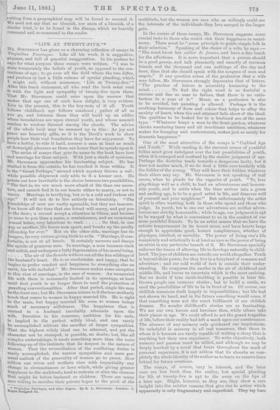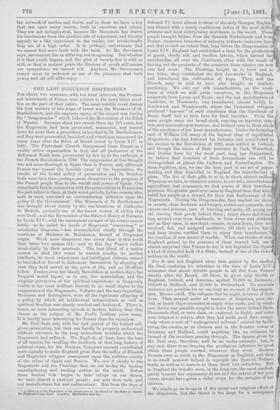"LIFE AT TWENTY-FIVE."* Mn, STEVENSON has given us D. charming
collection of essays in Virginibus Puerisque. Like all his work, it is suggestive, piquant, and full of graceful exaggeration. In his preface he says for what purpose these essays were written. "I was to state temperately the beliefs of youth, as opposed to the con- tentions of ,age ; to go over all the field where the two differ, and produce at last a little volume of special pleading, which I might call, without misnomer, ' Life at Twenty-five.'" After this frank statement, all who read the book must read it with the light and sympathy of twenty-five upon. them. That Mr. Stevenson could seize upon the essence that makes that age one of such keen delight, is very evident. Live in the present, this is the key-note of it all. Youth follows childhood, ago follows manhood ; gather of all as You go, and between them they will build up an edifice whose foundations are upon eternal youth, and whose summit reaches to wisdom throned among the clouds. The advice ; of the whole book may be summed up in this : As joy and Peace are heavenly gifts, so it is the Devil's work to show people how little real foundation they have for enjoyment. To have a hobby, to ride it hard, assures a man at least as much
of downright pleasure as there are hours that he spends upon it. The series of essays that give its name to the book have love and marriage for their subject. With just a shade of cynicism, Mr. Stevenson approaches his fascinating subject. He has studied it from the outside, he has touched it from within. It is the " Great Perhaps," around which mystery throws a veil ; while possible shipwreck only adds to it a keener zest. He points out bow inevitable is the choice between two possibilities, 4` The fact is, we are much more afraid of life than our ances- tors, and =net find it in our hearts either to marry, or not to marry. Marriage is terrifying, but so is a cold and forlorn old
lags." It will not do to live entirely on friendship. "The riendships of men are vastly agreeable, but they are insecure. ou know all the time that one friend will marry, and put you o the door ; a second accept a situation in China, and become o more to you than a name, a reminiscence, and an occasional eased letter, very laborious to read So that, in one ay or another, life forces men apart, and breaks up the goodly ellowship for ever." But on the other side, marriage has its
i-langers, its very virtues giving birth to evils, " Marriage, if coins ortable, is not at all heroic, It certainly narrows and damps he spirits of generous men. In marriage, a man becomes slack and selfish, and undergoes a fatty degeneration of his moral being. ..... The air of the fireside withers out all the fine wildings of the husband's heart. He is so comfortable and happy, that he begins to prefer comfort and happiness to everything else on earth, his wife included." Mr. Stevenson makes some exception to this view of marriage, in the ease of women. An unmarried life with them is necessarily limited in its openings, at least until first youth is no longer there to need the protection of guarding conventionalities. After that period, single life may be the freer one; but Mr. Stevenson misses in it the true motherly 'touch that comes to women in happy married life. He is right
, in the main, but happy married life even to women brings much of necessary selfishness, The happiness that is centred in a husband inevitably rebounds upon the wife. Devotion to his concerns, ambition for his ends, is implied in the perfect wifely ideal, and can rarely be accomplished without the sacrifice of larger sympathies. That the highest wifely ideal can be attained, and yet the character not be cramped, is possible, no doubt; but, like all Complex undertakings, it needs something more than the mere following-up of the instincts that lie deepest in the nature of women. That the reconciliation of the conflicting duties is rarely accomplished, the narrow sympathies and mere per- ' ennal outlook of the generality of -women go to prove. How
tit\ seldom can wives and mothers view with impartiality any 'change in circumstances or laws which, while giving greater happiness to the multitude, tend to restrain or alter the chances that might lie before husband or children. There are many men willing to sacrifice their private hopes to the good of the ...* Viraini6us PItOri8qUe, and is Papers. By R. L. Stevenson. London : C. 4egatt PItuLand Co.
multitude, but the women are rare who as willingly could see the interests of the individuals they love merged in the larger gain.
In the course of these essays, Mr. Stevenson suggests some crucial tests to those who would risk their happiness in matri- mony. There must be " some principle to guide simple folk in their selection." Speaking of the choice of a wife, he says :— " She must know her metier de femme, and have a .fine touch for the affections. It is more important that a person should be a good gossip, and talk pleasantly and smartly of common friends and the thousand and one nothings of the day and hour, than that she should speak with the tongues of men and angels." If any question arises of the profession that a wife may follow, Mr. Stevenson strongly deprecates that of letters. " The practice of letters is miserably harassing to the
mind To find the right word is so doubtful a success and lies so near to failure, that there is no satis- faction iu a year of it." Music as a profession is also to be avoided, but painting is allowed. Perhaps it is the soothing harmony of form and colour that helps to allay the anxiety of heart, when the end attained falls short of the ideal. The qualities to be looked for in a husband are of the same type. "Whatever keeps a man in the front garden, whatever checks wandering fancy and all inordinate ambition, whatever makes for lounging and contentment, makes just so surely for domestic happiness."
One of the most attractive of the essays is " Crabbed Age and Youth." While reading it, the sternest censor of youthful follies must grow indulgent over the lost possibilities of youth, when it is cramped and confined by the staider judgment of age. Perhaps the doctrine tends towards a dangerous laxity, but it does not matter much, if we do deal a little over-tenderly with the foibles of the young. They will have their foibles, whatever their elders may say. Mr. Stevenson is not speaking of real errors, when he pleads for the vagaries of youth. " To, love playthings well as a child, to lead an adventurous and honour- able youth, and to settle when the time arrives into a green and smiling age, is to be a good artist in life, and deserves well of yourself and your neighbour." But unfortunately the artist spirit is often wanting, both in those who spend and those who judge. In youth, ten to one our adventures are neither adven- turous nor strictly honourable ; while in age, our judgment is apt to be warped by what is convenient to us in the conduct of our more youthful friends. To be an artist means that wo.have the artistic temperament in its truest sense, and have hearts large enough to appreciate good, honest completeness, whether of physique, intellect, or morality, The power of living one's life completely and artistically is at least as rare as the power of being an artist in any particular branch of it, Mr. Stevenson specially enforces the lesson of allowing life to develops naturally in child- hood. The joys of children are outside our world altogether. Truth is beyond their power, for they live in a fairyland of romance and adventure ; and our cold world of fact is outside their under- standing. He compares the castles in the air of childhood and middle-life, and leaves us uncertain which is the most enticing. But we doubt if true castle-building is possible in later life. Grown people can compose stories ; but to build a castle, we need the possibilities of life to be in front of us. Of course, our childish romances dealt largely in impossibilities ; but life had not shown its hand, and in the future something would come, if that something were not the exact fulfilment of our childish dreams. No wonder childhood's stories are so fascinating. We are our own heroes and heroines then, while others take their places in age. We could. afford to act the grand. tragedies of life,bef ore their reality had left a mark upon our countenance. The absence of any memory only quickened our inspirations. So unhelpful is memory in all real romances, that those in whom it is keenest are rarely capable of writing a story that is anything but their own experience. To write objectively, both memory and passion must be stilled, and although we may be deeply touched by a novel that bears throughout the mark of personal experience, it is not seldom that its absorbs so com- pletely the whole identity of its author as to leave no reserve force behind for future creations.
The essays, of course, vary in interest, and the later ones are less fresh than the earlier, but special pleading for life a.t twenty-five is apt to die away on the lips of a later age. Slight, however, as they are, they show a rare insight into the subtler reasons that give rise to action which apparently is only fragmentary and superficial. They lay bare
the network of motive and desire, and in them we have a key that can open many secrets, both in ourselves and others. They are not metaphysical, because Mr. Stevenson has drawn his conclusions from the positive side of experience, and thereby appeals to a like experience in the reader, but intellectually they are of a high order. It is, perhaps, unfortunate that we cannot find more fault with the book. As Mr. Stevenson says, amusement lies in differing, not in agreeing. But whether it is that youth lingers, and the glow of twenty-five is with us still, or that in mature years the illusions of youth still arouse our sympathies, we cannot tell. Anyhow, Mr. Stevenson's essays must be reckoned as one of the pleasures that both young and old will alike enjoy.





























 Previous page
Previous page